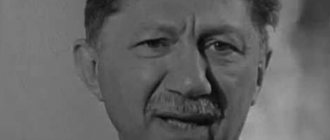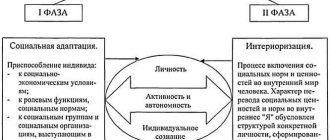When a new personality is born, it receives a unique character as a gift. Human nature can consist of traits inherited from parents, or it can manifest itself in a completely different, unexpected quality.
Nature not only determines behavioral reactions, it specifically influences the manner of communication, attitude towards others and oneself, and towards work. A person's character traits create a certain worldview in an individual.
A person’s behavioral reactions depend on character
Personality traits and character structure
Each individual during his life acquires a unique set of qualities, which are called character traits. On their basis, the formation of a personality structure is carried out, which determines a person’s actions and behavior. To better understand the nature of personality and character development, it is necessary to study the variety of definitions of these terms.
Concept and definition in psychology
The concept of personality allows us to reflect the social nature of the individual - the owner of a special consciousness. In psychology, this term refers to a whole system of human properties, the manifestation of which occurs exclusively in activity.
Additional Information. R. Cattell believes that thanks to the concept of “personality” it is possible to characterize a person’s behavior in a given situation.
A personality trait in psychology is nothing more than a stable feature of an individual, which manifests itself in his actions. By personality traits, G. Allport understood unique psychological blocks that help combine a person’s reaction into a single stimulus.
Character Structure
Personality properties form character, which means that it consists of a set of individual characteristics of an individual that determine a person’s behavior.
What is it for?
Everyone can try to make their own psycho-portrait or study the behavior of a loved one. However, to obtain accurate and most reliable data, it is better to seek help from a specialist. To fully determine your personality characteristics, sign up for my personal consultation. Having such data, you can find the most suitable occupation, hobby, find out the degree of your openness and sociability, identify goals, and increase self-esteem.
Basic character traits
Qualities of a man - bad and good character traits, what to cultivate in yourself
Character makes a person unique and helps to stand out from the crowd. Any individual is characterized by the desire to be accepted by society, to become part of a team, family or social group.
Additional Information. Nobody wants to be an outcast. Therefore, the need to be around other people is a natural human need.
To become a part of any society, an individual must not only perform useful functions, but also have a certain character. Knowing which hypothetical traits are welcomed in a group and which are rejected, it will be much easier to build communication with people.
Negative traits
Negative personality traits do not lead an individual to positive results. Negative manifestations of character are condemned in society. Among the main negative character traits, the following options can be distinguished:
- selfishness;
- greed;
- pettiness;
- envy;
- malice;
- deceit;
- self-criticism;
- cowardice;
- laziness;
- stubbornness.
Each of these properties can be diagnosed differently in people. In some people you can find the whole “set” of negative traits, in others you can find several of the most unpleasant “instances”.
How to overcome negative character traits
Important! Some negative qualities can be transformed into positive ones if a person works on himself.
Example: a greedy person can become thrifty, a stubborn person can become goal-oriented, a self-critical person can become creative, and a lazy student can become painstaking.
Positive features
Positive personality traits enable an individual to be useful, reliable, and valuable in society. Each era has its own list of socially significant character traits:
- If ideas focused on individual success are promoted in society, then hard work, initiative, determination, self-sufficiency and independence will be important positive personality traits;
- If collectivism is the main value of society, then individualism will be condemned and rejected in it. Qualities such as loyalty, friendliness, and stress resistance will be represented on the “pedestal.”
Despite this, there is a number of universal human values, among which the following positive features can be distinguished:
- loyalty;
- generosity;
- justice;
- modesty;
- goodwill;
- reliability;
- honesty;
- politeness;
- sense of responsibility;
- determination;
- hard work.
Some positive properties can transform into negative ones. For example, a person cannot always trace the moment when perseverance becomes stubbornness, determination transforms into aggression, and a tolerant individual becomes susceptible to the opinions of others.
Important! To analyze the presence of positive and negative character traits, you need to pay attention to the attitude of others towards the individual.
The attitude of others is the key to self-improvement
Society is a kind of mirror that reflects the real appearance of an individual.
Hippocratic theory
This ancient doctor and thinker is considered the creator of one of the main ideas regarding human essence. In those distant times, the basis of his theory was the physiological component of people. However, the concept developed by Hippocrates was constantly revised, and a couple of centuries ago, psychology began to study the 4 types of human character he proposed. Among them are the following:
- Choleric. People with this type of character are quite passionate, quick-tempered, and sometimes aggressive. It is difficult for them to control their emotions, as well as the reactions that manifest themselves to the influence of irritating factors in the outside world. Choleric people are prone to frequent outbursts of anger, sudden mood swings and other sudden changes in behavior. They spend their energy very quickly and deplete their reserves of strength.
- Sanguine. This type of character includes cheerful and active people. They, like choleric people, are characterized by sudden mood swings. But at the same time they have a stable and quick response to external factors. Sanguine people are purposeful and productive people.
- Phlegmatic person. These are rather reserved people who practically do not show their emotions. They are unhurried, have a balanced psyche, are persistent and persistent in their work.
- Melancholic. Such people are impressionable and very vulnerable. They are acutely aware of their own failures. In the presence of external stimuli, melancholic people exhibit sharp reactions.
Psychology still considers the 4 types of human character proposed by Hippocrates today. They are considered basic and rarely appear in their pure form. Each person may have traits of each of these types, but only those belonging to one of them will be dominant. From this we can conclude that each of us is an individual, complex, multifaceted and unusual person.
Individual character traits
Personality qualities - what is it in psychology, characteristics
Individual psychological traits that characterize personality are studied by differential psychology and criminology. The dynamic structure of human characteristics includes 4 main groups:
- biological traits: inclinations, temperament, primary needs;
- social properties of the individual: worldview, moral qualities, orientation;
- individual abilities: talent, giftedness or genius;
- experience: skills, abilities, habits and knowledge.
It must be taken into account that not all individual characteristics of an individual can become character traits.
Inclinations and abilities
Important! All character traits relate to personality traits. This fact occupies a special place in criminological practice.
Thanks to individual psychological traits, a person is able to achieve success and improve in activities.
How to draw up the correct psychological portrait of any person: sample
To draw up a psycho-portrait of yourself or someone else, you need to seek help from a specialist in the field of psychology or try to do it yourself. Various questionnaires, effective methods and techniques for assessing a person’s personality and scrupulously analyzing their abilities will help you. These include a portrait based on a drawing, studying handwriting, posing logical riddles, testing, communicating without words, but the easiest and fastest option is studying the properties described above. You just need to take a notepad and write down each item.
Plan
A typical sample will tell you how to make a reliable psychological portrait of a person. You should follow simple instructions:
- Consider personal data - gender, age, external parameters.
- Social status – position, specialty, marital status.
- A short biography, which indicates the main, most important events and moments of life, shocks, emotions.
- Analysis of the 13 personality traits described above.
- Conclusions, in which each item is examined in detail, existing problems are identified, ways to solve them, and abilities and skills are revealed.
You must understand that the technique must correspond to the age, experience and level of education of the person being studied. It is necessary to create comfortable conditions for the experiment. The overall picture must be drawn up in such a way that it is understandable to a person without specialized education and does not burden it with unknown terms.
Strong-willed traits of people
Positive character traits of a person - what applies to them
To achieve goals, an individual needs the ability to mobilize his own psyche. Willpower is the foundation of this skill.
Note! The volitional qualities of a person are not always innate. Often an individual has to train them on his own. It takes a lot of time to learn. The main thing is that training should be repeated periodically even after obtaining good results.
How will is formed
There are many methods for studying the volitional properties of a subject. The most common are:
- test N.N. Obozov “Self-esteem of willpower”;
- observation method A.I. Vysotsky;
- general assessment of will in adolescents according to N.E. Istanbulova.
Human volitional traits are divided into 2 types:
- moral;
- extraordinary.
The second type of qualities is the basis for improving the moral side of a person. Among the main volitional traits of an individual are:
- Energy. Thanks to this property, a person is able to act quickly and make responsible decisions.
- Self-control. This strong-willed quality protects the individual from impulsive and rash actions. With self-control, the subject is his own leader.
- Courage. Allows a person to overcome internal fears and fears.
- Patience. With the help of this volitional effort, the individual is able to achieve his goals, despite the presence of internal obstacles: fatigue, boredom, headache.
- Initiative. Thanks to this quality, a person is able to show mental activity, creativity and independence to achieve better performance results.
- Strategic. Allows a person to correctly set priorities not only in his personal life, but also in the business sphere.
- Determination. This strong-willed trait helps the individual to consciously set himself the necessary tasks and actively act to achieve them.
- Integrity. A strong-willed trait allows an individual in any field to be based on his own views, and not follow the lead of other people.
Psychological characteristics of a 4th grade student
Example
Barinov Maxim Petrovich.
Born in 2001.
The child can be described as emotional, but at the same time friendly. During my studies, many external manifestations appeared, for example, the child is impulsive and active. The child does not always control his words, and most importantly, his actions. The state of health is average.
His mood changes very often. The social distance that is built between teachers and students cannot always be maintained.
Completes independent tasks only with the help of adults. He can also predict the outcome of the game and make assumptions. Independent, active, chooses his own ways to solve problems and problems. Can become a support for weaker students when working in pairs.
Always has a clear idea of what actions to take in the future, makes plans, and not how the card will fall. It is noted that he is inclined to choose non-standard methods, as he sees them as interesting.
He cannot always give an adequate assessment of his actions.
As for cognitive interests, the child has a wide range of knowledge and great potential for expanding it. However, as the child himself notes, studying is not a priority activity for him.
The child develops sensory systems with certain characteristics.
For example, he remembers material said out loud best. Concentrates attention not always well, rather at an average level.
Understanding distributes as required by the teacher.
Auditory memory is better developed than visual memory.
The nervous system can be classified as medium and weak. This means that the child easily takes on complex tasks, but quickly gets tired on the way to the desired solution. Sometimes he can be oversaturated with knowledge. However, if necessary, it can restore the ability to perceive in a short time.
Has good productivity in the first half or in the very middle of the lesson.
The rate of development of his psychological activity generally corresponds to his age.
As for the emotional and personal sphere, it is characterized by a high level of anxiety. The child also strives to become a leader in his group and to assert himself, sometimes at the expense of others. Unfortunately, the child has low self-esteem and has difficulty withstanding criticism.
Doesn't like it when teachers compare him with others. He prefers to communicate with the teacher only individually, after the lesson. Especially when it comes to checking the quality of the level of knowledge, tests, and so on.
The child has practically no motivation to study, but this is affected by high anxiety, since the child is very afraid that the results will be negative.
Maxim's family has an older brother. The child copies his behavior in every possible way, thereby causing discontent among adults who understand that the child is really going to imitate his brother.
Therefore, the child reacts very poorly to criticism.
In the peer group, on the contrary, he has positioned himself properly and is an informal leader.
What can teachers advise?
This is also important to know:
Ready-made characteristics for a 2nd grade student from the class teacher, for a student, for PMPK
The advice of teachers comes down to the fact that the child needs praise and attention from his parents. In addition, it is necessary to promote the development of motivation to study and provide assistance in solving complex problems.
New material that is offered for study is best considered in the first half of the day. If your study material is quite complex, it is better to distribute it into two lessons at once for better learning.
In order for a child to become motivated to acquire knowledge, it is worth offering him those types of tasks and work that are non-standard and creative.
It is better not to show criticism towards the student, and if you have to, then do it as loyally and reasonably as possible. This is the characteristic of an MOU student.
The relationship between character and personality structure
Character is a kind of “foundation”, which, together with abilities and emotions, forms the structure of the personality.
How are these two concepts related?
The close relationship between a person’s mental properties and the main components of the psyche is achieved thanks to the following characteristics:
- By character, you can not only assess the integrity of a person, but also predict or correct actions.
- The orientation of an individual is closely related to his mental properties, and therefore influences the activities of the individual.
- Character formation occurs during the active actions of the subject. In other words, mental properties are determined by the existence of the individual.
- All character traits are interconnected with each other. Thanks to constant interaction, they form a holistic personality structure.
- The character of an individual prevents or helps the subject to build various relationships with society, solve complex life problems, and show will and patience.
In order to fully study the distinctive characteristics of a person, you need to “eat” a whole pound of salt with him. However, the uniqueness of the character can be noted, if not at first, then certainly at second glance. Even if an individual is withdrawn and shy, these properties will characterize the manifestation of his character. If a subject wants to correct his own qualities, a professional psychologist can come to the rescue.
The theory of Carl Gustav Jung
This famous Swiss psychologist and psychiatrist created, at first glance, a rather simple classification of characters, but at the same time quite deep.
The theory of C. G. Jung examines the interaction of the conscious and unconscious. The scientist identified the following types of people according to psychology and character:
- Extroverts. The activities and reactions of these people largely depend on the outside world, on the people and events around them. Extroverts are pleasant and sociable conversationalists, cheerful and open, with a lot of friends. They try to take everything from life, while caring little about their own health.
- Introverts. People with this type of character are more guided by their own feelings and experiences. It is quite difficult for others to understand them. Introverts are constantly uncommunicative and withdrawn, suspicious, characterized by a desire to analyze everything, and have very few friends.
- Ambiverts. In psychology, the character and personality of a person belonging to this type is considered as a combination of the previous two. Moreover, ambiverts borrowed all the good things from extroverts and introverts. Such people are excellent analysts. They have a subtle soul and are periodically prone to the desire to be alone. At the same time, ambiverts have such charisma, humor and wit that they can easily become the soul of a large company.











